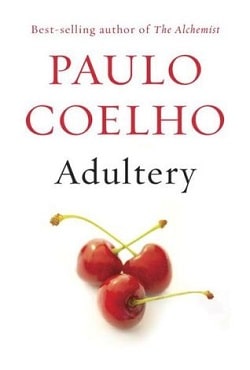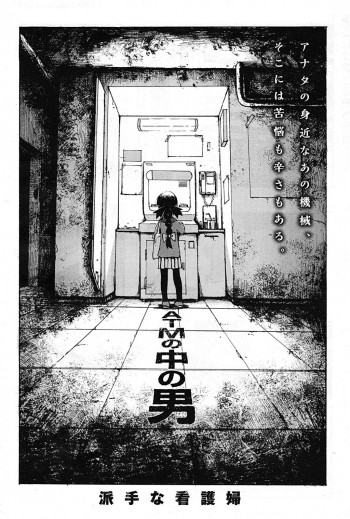Summary

Adultery
by Paulo Coelho
I want to change. I need to change. I'm gradually losing touch with myself.
Adultery, the provocative new novel by Paulo Coelho, best-selling author of The Alchemist and Eleven Minutes, explores the question of what it means to live life fully and happily, finding the balance between life's routine and the desire for something new.
.
Read
Adultery on http://kissnovel.net
Martial Peak Reviews
Paulo Coelho's Adultery is a thought-provoking exploration of the human condition, delving into the complexities of love, desire, and the pursuit of happiness. Known for his ability to weave philosophical insights into compelling narratives, Coelho once again captivates readers with a story that is both intimate and universal. The novel centers around Linda, a successful journalist who seemingly has it all—a loving husband, a stable career, and a comfortable life. Yet, beneath this facade of perfection lies a profound sense of discontent and a yearning for something more.
The premise of Adultery is deceptively simple: Linda's life takes a turn when she rekindles a relationship with an old flame, Jacob. This encounter serves as a catalyst for her internal struggle, prompting her to confront the monotony of her existence and the societal expectations that bind her. Coelho's narrative invites readers to ponder the question: what does it truly mean to live life fully? Through Linda's journey, the author explores the tension between routine and the desire for novelty, a theme that resonates deeply in today's fast-paced world.
One of the most striking aspects of Coelho's writing is his ability to articulate the complexities of human emotions. Linda's character is meticulously crafted, embodying the conflict between her responsibilities and her desires. As she navigates her feelings for Jacob, readers witness her transformation from a woman trapped in a cycle of predictability to one who seeks to reclaim her identity. Coelho skillfully captures the essence of mid-life crises, illustrating how the quest for self-discovery can lead to both liberation and chaos.
The theme of adultery in the novel serves as a metaphor for the broader human experience of seeking fulfillment. Coelho does not condone Linda's actions; rather, he presents them as a reflection of her inner turmoil. The author delves into the psychological ramifications of her choices, exploring how infidelity can be both a symptom of deeper issues and a catalyst for change. This duality adds layers to the narrative, prompting readers to reflect on their own lives and the choices they make.
Coelho's prose is imbued with a lyrical quality that enhances the emotional weight of the story. His use of vivid imagery and poignant metaphors creates a rich tapestry that draws readers into Linda's world. For instance, the contrasting settings of her mundane daily life and the passionate encounters with Jacob serve to highlight her internal conflict. The author’s ability to evoke sensory experiences allows readers to feel Linda's longing and despair, making her journey all the more relatable.
Moreover, the novel raises important questions about societal norms and the nature of happiness. Coelho challenges the notion that a conventional life—marked by marriage, career, and stability—equates to fulfillment. Instead, he suggests that true happiness may lie in embracing one’s desires, even if they defy societal expectations. This theme is particularly relevant in contemporary society, where many individuals grapple with the pressures of conformity and the pursuit of personal happiness.
In terms of character development, Coelho excels in portraying the complexities of human relationships. Linda's interactions with her husband, her friends, and Jacob reveal the multifaceted nature of love and loyalty. Her husband, while supportive, represents the comfort of stability, while Jacob embodies the allure of passion and spontaneity. This dichotomy forces Linda to confront her own values and desires, ultimately leading to a deeper understanding of herself.
The impact of Adultery extends beyond its narrative; it serves as a mirror reflecting the struggles many face in their pursuit of happiness. Coelho's exploration of infidelity is not merely about betrayal; it is a commentary on the human condition and the quest for meaning in a world that often feels suffocating. The novel encourages readers to examine their own lives and consider what it means to truly live, rather than merely exist.
When comparing Adultery to other works by Coelho, such as The Alchemist and Eleven Minutes, one can see a consistent theme of self-discovery and the search for purpose. However, Adultery stands out for its raw and unflinching examination of infidelity and its consequences. While The Alchemist focuses on the pursuit of dreams and personal legends, Adultery delves into the darker aspects of desire and the complexities of human relationships.
In conclusion, Paulo Coelho's Adultery is a compelling and thought-provoking novel that challenges readers to reflect on their own lives and the choices they make. Through Linda's journey of self-discovery, Coelho masterfully explores the themes of love, desire, and the quest for happiness. The novel serves as a reminder that life is not merely about adhering to societal expectations but about embracing one's true self, even if it means venturing into the unknown. For those seeking a narrative that is both engaging and introspective, Adultery is a must-read that will linger in the mind long after the final page is turned.
























Reviews 0
Post a Reviews: